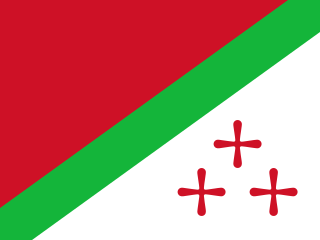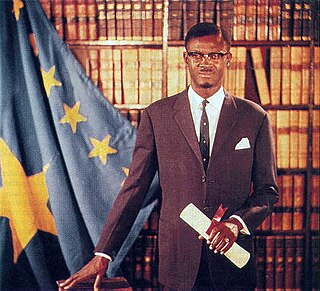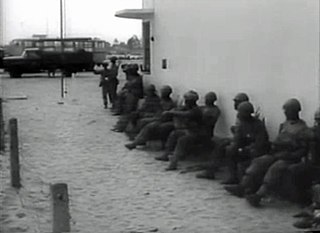
Patrice Émery Lumumba was a Congolese politician and independence leader who served as the first prime minister of the Democratic Republic of the Congo from June until September 1960, following the May 1960 election. He was the leader of the Congolese National Movement (MNC) from 1958 until his assassination in 1961. Ideologically an African nationalist and pan-Africanist, he played a significant role in the transformation of the Congo from a colony of Belgium into an independent republic.

The United Nations Operation in the Congo was a United Nations peacekeeping force which was deployed in the Republic of the Congo in 1960 in response to the Congo Crisis. The ONUC was the UN's first peacekeeping mission with significant military capability, and remains one of the largest UN operations in size and scope.

The State of Katanga, also known as the Republic of Katanga, was a breakaway state that proclaimed its independence from Congo-Léopoldville on 11 July 1960 under Moïse Tshombe, leader of the local Confédération des associations tribales du Katanga (CONAKAT) political party. The new Katangese state did not enjoy full support throughout the province and was constantly plagued by ethnic strife in its northernmost region. It was dissolved in 1963 following an invasion by United Nations Operation in the Congo (ONUC) forces, and reintegrated with the rest of the country as Katanga Province.
United Nations Security Council Resolution 143 was adopted on July 14, 1960. With Congolese requests for assistance in front of him, following the Mutiny of the Force Publique, Secretary-General of the United Nations Dag Hammarskjöld had called a meeting for the evening of July 13, acting under Article 99 of the Charter. After the Secretary-General's report and a request for military assistance by the President and Prime Minister of the Republic of the Congo (Leopoldville) to protect its territory, the Council called upon Belgium to withdraw its troops from the territory and authorized the Secretary-General to take the necessary steps to provide the Government with such military assistance that the national security forces may be able to meet fully their tasks. The Council asked the Secretary General to report to the Security Council as appropriate.

United Nations Security Council Resolution 145 was adopted unanimously on 22 July 1960. After considering a report by the Secretary-General, Dag Hammarskjöld, regarding the implementation of Resolution 143, the Council called upon Belgium to withdrawal its troops from the Congo and authorized the Secretary-General to take all necessary action to this effect. The Council further requested all states to refrain from any action which might impede the restoration of law and order in the Congo or undermine its territorial integrity, the Council then commended the Secretary-General for his prompt action in regard to Resolution 143 along with his first report and requested further reports be made as appropriate.
United Nations Security Council Resolution 157 was adopted on 17 September 1960. After a discussion of the Congo Crisis led to a lack of unanimity among the Security Council's permanent members and thus prevented it from exercising its primary responsibility for the maintenance of international peace and security, the Council decided to call an emergency special session of the General Assembly to make appropriate recommendations.

United Nations Security Council Resolution 161 was adopted on February 21, 1961. After noting the killings of Patrice Lumumba, Maurice Mpolo and Joseph Okito and a report of the Secretary-General's Special Representative, the Council urged the United Nations to immediately take measures to prevent the occurrence of civil war in the Congo, even if the use of force is necessary. The Council further urged the withdrawal of all Belgian and other foreign military, paramilitary personnel and mercenaries not with the UN and called upon all states to take measures to deny transport and other facilities to such personnel moving into the Congo. The Council also decided that it would launch an investigation into the death of Lumumba and his colleagues promising punishment to the perpetrators.
United Nations Security Council Resolution 169, adopted on November 24, 1961, deprecated the secessionist activities in Katanga as well as armed action against United Nations forces and insisted that those activities cease. The council then authorized the Secretary-General to take whatever action necessary to immediately apprehend and deport all foreign military personnel, paramilitary personnel and mercenaries not with the UN and requested that the SG take all necessary measures to prevent their return. The Council then asked all member states to aid the Government of the Republic of the Congo and to prevent any actions which might contribute to the conflict there.

The Katangese Air Force, officially the Katangese Military Aviation, was the air force of the short lived secessionist state the State of Katanga. Established in 1960 under the command of Jan Zumbach, the force consisted predominantly of Belgian, French, and British mercenary pilots, operating a small number of helicopters and smaller number of fixed wing planes, including three attack aircraft delivered by the CIA.
Joseph-Georges Kasongo was a Tanganyikan-born Congolese lawyer, businessman, and politician who served as the first President of the Chamber of Deputies of the Republic of the Congo. He later held office as a deputy prime minister and as a senator.

The Free Republic of the Congo, often referred to as Congo-Stanleyville, was a short-lived rival government to the Republic of the Congo (Congo-Léopoldville) based in the eastern Congo and led by Antoine Gizenga.
Operation Rum Punch or Operation Rampunch was a military action undertaken by United Nations peacekeeping forces on 28 August 1961 against the military of the State of Katanga, a secessionist state from the Republic of the Congo in central Africa. UN troops arrested 79 foreign mercenaries and officers employed by Katanga with little conflict.

The Lumumba Government, also known as the Lumumba Ministry or Lumumba Cabinet, was the first set of ministers, ministers of state, and secretaries of state who governed the Democratic Republic of the Congo under the leadership of Prime Minister Patrice Lumumba from 24 June until 12 September 1960. The government inherited many problems from the era of the Belgian Congo, a tightly administered colony which for most of its existence had few political freedoms. Its members came from different social classes and different tribes, and they held varied political beliefs. Weak and divided, its tenure was dominated by a widespread mutiny in the army and two secessions. An exodus of thousands of Belgian functionaries—who had controlled most of the bureaucracy—left the administration in disarray. The United Nations created a large multinational peacekeeping force to assist the government in reestablishing law and order. Western nations were under the impression that Lumumba was a communist, and the United States, Belgium, and France all worked to undermine and divide his government. Domestic opposition to the government cemented by late July, and Lumumba increasingly relied on only a few advisers, and rarely consulted the full Council of Ministers; several members of the government began acting without his direction. He resorted to increasingly authoritarian measures to maintain control over the country.
Rémy Mwamba (1921–1967) was a Congolese politician who twice served as Minister of Justice of the Democratic Republic of the Congo. He was also a leading figure of the Association Générale des Baluba du Katanga (BALUBAKAT).

On 5 July 1960, soldiers of the garrisons of Léopoldville and Thysville of the Force Publique, the army of the newly independent Republic of the Congo mutinied against their white officers. The revolt quickly spread throughout the Bas-Congo and engulfed the country in disorder, beginning the Congo Crisis.
On 5 September 1960 President Joseph Kasa-Vubu of the Democratic Republic of the Congo dismissed Prime Minister Patrice Lumumba from office. He also dismissed six other members of his government: Deputy Prime Minister Antoine Gizenga, Minister of Justice Rémy Mwamba, Minister of Interior Christophe Gbenye, Minister of Information Anicet Kashamura, Secretary of State Antoine-Roger Bolamba, and Secretary of State Jacques Lumbala.
The Battle of Kabalo was fought at Kabalo by United Nations peacekeeping forces and Baluba militias from 7 April to 11 April 1961 against mercenaries and the gendarmerie of the State of Katanga, a secessionist state rebelling against the Republic of the Congo in central Africa. The Katangese forces attacked the town as part of a larger offensive meant to restore their authority in northern Katanga which was challenged by the Baluba. A United Nations Operation in the Congo peacekeeping contingent garrisoning Kabalo, acting under the authority of their mandate to prevent civil war in the country, resisted the initial attack and arrested 30 mercenaries in Katanga's employ. Armed Baluba repelled a Katangese ferry carrying troops as well as an armoured train. The next day the ferry returned but was sunk by UN forces. Fighting continued over the next few days between the Baluba and Katangese until the latter withdrew. The battle led to a deterioration of relations between the Katangese government and the United Nations Operation in the Congo.

The Katangese Gendarmerie, officially the Katangese Armed Forces, was the paramilitary force of the unrecognized State of Katanga in Central Africa from 1960 to 1963. The forces were formed upon the secession of Katanga from the Republic of the Congo with help from Belgian soldiers and former officers of the Force Publique. Belgian troops also provided much of the early training for the Gendarmerie, which was mainly composed of Katangese but largely led by Belgians and later European mercenaries.
In August 1960 troops of the Republic of the Congo attempted to crush the secession of South Kasai by invading the declared state's territory. Though initially militarily successful, the attack faltered under intense international and domestic political scrutiny and the Congolese troops were withdrawn.

Operation Unokat, also styled Operation UNOKAT, was an offensive undertaken by United Nations peacekeeping forces from 5 to 21 December 1961 against the gendarmerie of the State of Katanga, a secessionist state rebelling against the Republic of the Congo in Central Africa. The United Nations had tried several times to reconcile the government of the Congo with the State of Katanga, which had declared independence under Moïse Tshombe with Belgian support in 1960.










